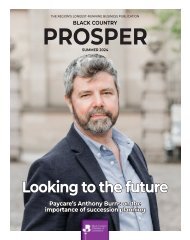Prosper Autumn, Black Country Chamber of Commerce magazine
Business news and advice, Black Country Chamber of Commerce
Business news and advice, Black Country Chamber of Commerce
You also want an ePaper? Increase the reach of your titles
YUMPU automatically turns print PDFs into web optimized ePapers that Google loves.
THIS IS THE BLACK COUNTRY: SPOTLIGHT ON TODAY’S CHALLENGES<br />
“We need to address long-term<br />
problems in the UK economy, such<br />
as low productivity, skills shortages<br />
and unequal growth across the UK”<br />
Sarah Williams (left)<br />
Continued from page 31<br />
Do you believe that the recent<br />
support announced for businesses in<br />
terms <strong>of</strong> energy costs went far<br />
enough?<br />
S Will: I don’t think it did, no. I think it is<br />
good that Government recognised the<br />
pressures on businesses caused by the<br />
energy cost crisis, but I think more could be<br />
done to support business.<br />
JD: Short answer? No.<br />
S Wdl: No. For many sectors the shortterm<br />
solution will make it difficult to create<br />
future certainty.<br />
CW: The Government has <strong>of</strong>fered a 50 per<br />
cent reduction for six months. My concern<br />
is: what happens in March? Will companies<br />
hold back now for fear <strong>of</strong> uncertainty,<br />
making short-term decisions to get through<br />
the current challenges rather than having<br />
longer-term objectives? Will they play it safe?<br />
RL: In a word, No. The promise to cap<br />
prices for the next six months is welcome<br />
but as a business, we need stability and<br />
clarity over a much longer timeframe – at<br />
least 12 months, preferably two years.<br />
What more would you like to see?<br />
S Will: I think more could be done to<br />
support SMEs and freelancers specifically.<br />
JD: Support has to be for longer than six<br />
months and we need incentives in the<br />
form <strong>of</strong> grant aid for green investment.<br />
S Wdl: We need clarity on what happens<br />
at the end <strong>of</strong> the six-month period. Longterm,<br />
businesses need to be incentivised to<br />
become energy efficient and there must be<br />
a plan for secure, clean and affordable<br />
British energy. Britain can go green, but<br />
businesses must work together.<br />
CW: Clear and concise communication<br />
about the energy plan from Government,<br />
specifically in relation to next steps and<br />
achievable timescales for businesses to react.<br />
Also, they should be discussing that<br />
longer-term view.<br />
RL: The recent announcements have given<br />
us some understanding <strong>of</strong> the landscape<br />
over the next few months but for my<br />
long-term planning, it’s not enough. The<br />
problem we all have is, if prices rise from<br />
one <strong>of</strong> my other suppliers, I can take steps<br />
to get round them: source a new supplier,<br />
or change what I buy. I can’t with energy;<br />
no matter where I go, the costs are the<br />
same. We have no control over the price.<br />
What are your priorities towards<br />
achieving net zero in your sector and<br />
what is limiting any impact?<br />
S Will: Sustainability is one <strong>of</strong> the Four<br />
Pillars which underpins all activity within the<br />
Business School. We have a sustainability<br />
policy which is managed by a working<br />
group to drive change and sustainability<br />
features highly in our curriculum. We are<br />
working on research and projects relating<br />
to waste management, recycling and the<br />
circular economy.<br />
JD: Crowe UK has committed to set<br />
near-term company-wide emission<br />
reductions in line with climate science with<br />
the Science Based Targets initiative (SBTi).<br />
We are currently identifying opportunities<br />
and implementing actions to reduce direct<br />
and indirect emissions.<br />
S Wdl: Our Green Committee lead the<br />
firm’s environmental and sustainability<br />
initiatives. As members <strong>of</strong> the Legal<br />
Sustainability Alliance, we are committed<br />
to reducing the impact <strong>of</strong> our operations<br />
and services on the environment and<br />
running as sustainably as possible. We<br />
encourage behaviours that reflect this,<br />
inside our business and with our suppliers,<br />
clients and contacts. We take an holistic<br />
approach with regards to sustainability but<br />
our priority is to look at the infrastructure <strong>of</strong><br />
our property and the supply chains in which<br />
we operate.<br />
CW: What a company does on the<br />
environmental front is increasingly an<br />
important consideration for would-be<br />
employees. They want to know a company<br />
is doing the right thing.<br />
Pertemps has made a commitment to be<br />
net zero by 2030, and we’ve undertaken a<br />
number <strong>of</strong> initiatives to achieve this. We<br />
report performance under the Streamlined<br />
Energy & Carbon Scheme, we’ve switched<br />
more than 50 per cent <strong>of</strong> our vehicle fleet<br />
to hybrid or electric and through internal<br />
policies, we have saved three million pieces<br />
<strong>of</strong> paper which equates to saving 312 trees.<br />
Additionally, by joining the Woodland<br />
Carbon Scheme, Pertemps has supported<br />
the planting <strong>of</strong> 2,377 UK native trees which<br />
will sequester around 557 tonnes <strong>of</strong> carbon<br />
throughout their lifetime.<br />
RL: We’ve approached the Net Zero<br />
challenge from a number <strong>of</strong> directions. Our<br />
priority is to install solar panels on our<br />
head <strong>of</strong>fice and run on renewable energy,<br />
putting excess power back into the grid,<br />
while at the same time we’ve focused on<br />
our operations and reduced energy use<br />
where possible. All staff are now in electric<br />
vehicles, but even then we’ve asked them<br />
to cut down on road mileage and always<br />
consider whether the journeys are<br />
necessary. In addition we’ve introduced a<br />
salary sacrifice scheme for those who want<br />
to cycle to work.<br />
What other areas do you think<br />
government should be prioritising at<br />
the moment?<br />
S Will: We need to address long-term<br />
problems in the UK economy, such as low<br />
productivity, skills shortages and unequal<br />
growth across the country. Without<br />
32 PROSPER AUTUMN 2022

















